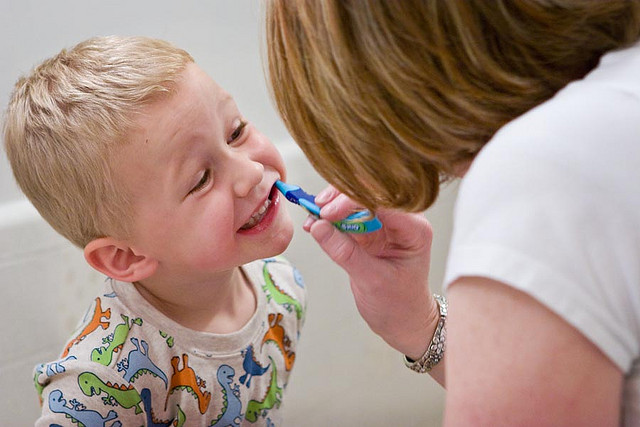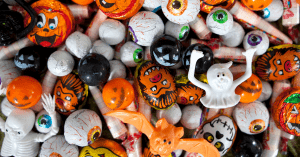The American Dental Association recently changed its recommendations for children, now advising caregivers to start brushing children’s teeth with fluoride toothpaste as soon as the first tooth comes in, rather than waiting until age 2. The change was made in response to a study that found that 25 percent of children in the U.S. develop cavities before entering kindergarten.

Tooth decay affects children in our country more than any other chronic infection or disease. Left untreated, it can lead to problems eating, speaking and even learning. The good news is that there effective tips you and your family’s caregivers can follow to protect your children’s teeth and help them to develop good dental habits that will last a lifetime.
Tips for Oral Health in Infants:
- Clean infant gums with a warm washcloth. You can even brush gums with a soft children’s toothbrush and water.
- As soon as teeth appear, brush twice daily with fluoride toothpaste.
- Start flossing when two teeth touch each other.
- Don’t put your baby to bed with a bottle of juice, formula, or milk.
- Help your child break the pacifier habit by age 2. Long-term use can affect their bite and overall dental health.
Tips for Oral Health in Young Children:
- Kids can start brushing their teeth with help from an adult by age 2 or 3, though some are not ready to brush on their own until age 6.
- You should help children floss until they are age 10 and able to go it alone.
- Don’t give kids a choice when it comes to brushing their teeth at least twice a day. If necessary, motivate them with stickers or small rewards (not candy!).
- Don’t give kids mouthwash until they are easily able to spit out.
- Pediatricians advise limiting kids to no more than 4 ounces a day of 100% fruit juice to avoid sugary beverages bathing the teeth.
- Kids should avoid the foods that are bad for their teeth or brush after eating them. Sticky, gummy sweets come to mind when you think of foods that are harmful to teeth, but starchy foods (such as white bread), dried fruit and foods that are both sweet and acidic – such as soft drinks and chewable vitamins – are also culprits.
- Encourage kids to eat food high in nutrients that help teeth grow and stay strong and healthy, including foods high in Vitamin C (citrus, tomatoes), calcium-rich foods and vegetables, such as sweet potatoes and broccoli, that are high in Vitamin A.
Remember, healthy dental habits are meant to be followed everyday. When you are away from your kids, your sitter can be a helpful advocate in keeping your kids’ teeth healthy and strong.


